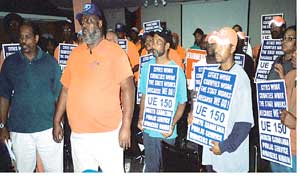Sanitation workers forced into wildcat strike
Sanitation workers forced into wildcat strike
On the mornings of Sept. 13, 14 and 15, workers for the City of Raleigh Solid Waste Division carried out an historic wildcat strike, withholding their labor power and shutting services for several hours on each of those days.
 Sanitation workers in Raleigh, N.C. WW photo: Dante Strobino |
In a plant with over 100 workers, more than 80, including both drivers and laborers, refused to mount the trucks and drive the city streets to pick up the garbage. The vast majority of these workers are Black.
Sanitation workers suffer from some of the worst conditions of all public employees in a city rife with irresponsive governmental bureaucracy and cronyism. These super-oppressed workers are raising their voices and organizing around their just demands, which include: no forced overtime (10 hours a day maximum), time-and-a-half pay for voluntary overtime work, all temps be made permanent workers, an end to harassment from bosses, and respect for the workers’ right to organize and elect their own leaders.
UE Local 150—the North Carolina Public Sector Workers Union—has been organizing public sector workers since 1996. It represents workers in four strategic areas: Department of Health and Human Services, the University of North Carolina system, city workers, and private workers in auto and aerospace in eastern North Carolina. UE 150 has been meeting with Raleigh sanitation workers for over a year now and supported the recent worker-initiated job actions.
On Sept. 14, over half of the solid waste workforce attended the UE 150 union meeting. There they voted, signed up and took an oath to join and build the union. Many other workers who could not attend the meeting have already joined. Many others are joining every day. In the parking lot outside, energy was high as workers chanted, “The orange brigade is rolling in.” The workers had pledged to wear bright orange shirts.
There was an incredible amount of unity in the room, as workers themselves decided what steps to take next, elected a leadership structure to meet with bosses and speak with the media, and decided on what demands to prioritize.
Raleigh is one of the fastest growing cities on the East Coast. From 1990 to January 1999, Raleigh registered a 30.1 percent increase in population and expanded its area by more than 20% but has not had a similar growth in the workforce. In fact, recently the City Council cut $135,000 from the budget to get rid of six city worker positions. The city has also implemented “one-armed bandits,” new automatic trucks that only need one worker to operate, causing increased stress, danger and workload.
Jimmy Gaye, a solid waste laborer for 22 years and UE 150 member said, “The city is growing but the workforce is not growing. … The only changes I have seen have been to benefit the [bosses]. The job action has been a long time coming. They cut down our truck from four to three people and made me work … without extra pay. I joined the union so someone would listen to me. The heads and superintendent won’t listen.”
Speaking about the high risk work environment, he said, “I have seen a man almost get his head cut off here; I know one guy got killed; I have seen fights; they get against each other, until we are mad because the system is mistreating us.”
As of Sept. 19, the sanitation workers have gone back to work because they care about the public’s health. They are giving the city until Sept. 22 to meet their demands. If the city abuses this act of good faith and does not meet their demands, then the workers will be forced to consider other serious actions.
For the first time that most workers can remember, an assistant city manager—Lawrence Ray—was forced to come right to the sanitation yard and speak to workers and hear their issues face to face.
This whole struggle must be considered in the context of the deep anti-union sentiment in the South. This struggle is also part of the movement for collective bargaining rights and to repeal the so-called “right to work” anti-union clause, North Carolina 95-98. This is a goal of the International Worker Justice Campaign initiated by Black Workers For Justice, UE Local 150 and others.
The workers are asking people to call Mayor Charles Meeker at 919-833-8756 (home) and 919-828-0564 (work) to express their support.
Strobino is an organizer with the Raleigh FIST (Fight Imperialism, Stand Together) youth group and UE Local 150.


<< Home